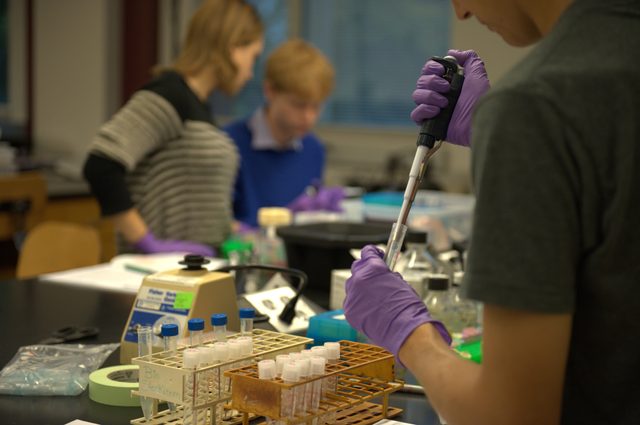 For decades, Carleton’s science program has forged a rock-solid reputation
For decades, Carleton’s science program has forged a rock-solid reputation
Carleton has enjoyed a reputation as a science powerhouse for decades. The STEM — science, technology, engineering, and mathematics — fields are among the most popular academic disciplines at Carleton, and unlike at many other institutions, Carleton’s STEM majors attract high numbers of women as well as men. In 2016, three of the college’s top five majors were STEM subjects: biology first with 55 graduates, computer science third with 51, and mathematics fifth with 34.
Here are seven signs of science strength that set Carleton apart
1. Innovative research
Carleton receives more NSF grant funding than any other liberal arts college. Over the past six years, Carleton has received 46 grants from the National Science Foundation totaling more than $15.1 million. Funding from the NSF and other prestigious national sponsors has provided leadership and outreach for numerous STEM faculty and students, supporting faculty research projects as varied as studying the genetics of a rare Minnesota snake, analyzing gravitational waves emanating from black holes and supernovas, and conducting field work on the geology of south-central Alaska.
2. Widespread research
Professors aren’t the only ones actively researching. Forty percent of students participate in mentored research too. “Classes in biology and neuroscience are great, but actually doing research teaches you in a different way,” says Malavika Suresh ’18. She spent the summer researching macrophages in the body’s immune system in the University of Texas MD Anderson Cancer Center and also has held research positions on campus. “Research is in-depth and focused and relates to the real world,” she says.
3. Prestigious recognition
Carleton has received 28 continuous years of HHMI funding, and is one of just four liberal arts colleges nationwide to have received funding from the prestigious Howard Hughes Medical Institute in every one of the organization’s competitions. This funding has enabled faculty to develop innovative curricula and identify equipment and spaces that will best support the education of future research leaders in science and medicine.
4. Ambitious students
Carleton ranks highly among baccalaureate-level institutions in terms of the number of its alumni who earn doctoral degrees. The rankings are even more impressive when considering the proportion of doctorate degrees earned per graduate: on that basis Carleton outranks even most top research universities. For example, Carleton ranks first among 2,700 U.S. colleges and universities in numbers of alumni who earn doctorate degrees in geosciences, according to National Science Foundation data from 1966 to 2014. On that same basis, Carleton ranks second in physical sciences, second in the life sciences, and fifth in math and computer science disciplines. Per capita, Carleton also ranks sixth among all institutions in the number of women who receive PhDs in the sciences.
5. Science after Carleton
The majority of graduates from each STEM department find work in healthcare, science/lab research, information systems/technology, engineering, or environmental science. Another 19 percent of Carls continue working in their disciplines as teachers and professors. “My biology classes provided a very strong foundation that was key to my success at all stages of my career,” says Stephanie Watowich ’83, P ’15. She has held a variety of posts within the biomedical field; currently, she is a professor of immunology at the University of Texas MD Anderson Cancer Center. “My courses gave me confidence that I could think analytically and creatively,” she says, “and my non-science courses honed my writing, critical thinking, and oral presentation skills, which are essential for my career as a scientist.”
6. Quantitatively rich classes
Professors across the college thoughtfully work quantitative reasoning into their courses; in fact, almost a quarter of Carleton’s regular classes are a part of the Quantitative Inquiry, Reasoning, and Knowledge Initiative. This academic requirement reflects Carleton’s strong liberal arts identity—students are required to apply interdisciplinary techniques across disciplines, so numbers go far beyond math classes.
7. Dedication and commitment
Carleton has never been content with resting on its laurels. Even while enjoying our current vibrant scientific community, we are taking steps to ensure future excellence with plan to break ground this summer on a revolutionary science complex that will integrate scientific disciplines and better support project-based and collaborative learning. $97.5 million has been targeted for these new science facilities.
